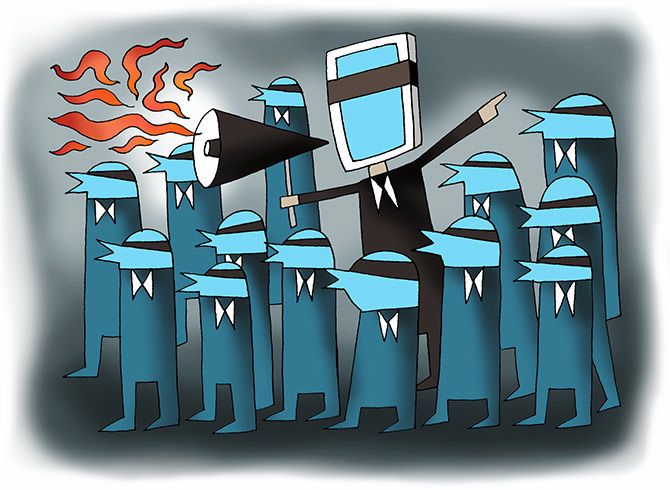 | « Back to article | Print this article |
'If the prime minister wants to be seen as a global statesman, then is it not embarrassing to be so closely associated with a gang of foul-mouthed bullies?' asks Vir Sanghvi.
Illustration: Uttam Ghosh/Rediff.com

Here's what we know about online trolls. We know that trolls tend to be lonely or socially dysfunctional men whose own sexual inadequacies lead them to be (often violently) misogynistic.
We know that all trolls like to escape the sad and solitary nature of their everyday existence by attacking (or abusing or even threatening) famous people.
And we know that the anonymity provided by such social media handles as Twitter (a laboratory-grade petri-dish for the breeding of sleazy abusers) tends to embolden even the most diffident and timorous of men.
But Swati Chaturvedi argues in this slender volume, those are global generalisations that hardly capture the Indian reality.
In India, she says, trolling is an organised political activity and trolls are the Twitter equivalent of a communally charged mob out to burn down somebody's home (or village) as part of a pogrom.
Her book, I Am a Troll: Inside the Secret World of the BJP's Digital Army, is less about trolls in general and more about what she claims is 'the BJP’s digital army.'
In her telling, the Bharatiya Janata Party (or the larger Sangh Parivar) uses volunteers and paid employees to function in concert and to execute centralised directives to 'constantly peddle hate tweets and conspiracy theories and slander journalists.'
Worse still, she claims, the hate-filled tweets are packed with communally volatile misinformation (a mythical exodus of Hindus from Kairana in UP, for instance) and contain threats: Hire so-and-so and we will boycott your company/paper/channel/product or even worse.
Although there are many examples in the book, the one that has received the most public attention is the threatened boycott of Snapdeal if it did not sack Aamir Khan as its brand ambassador after the actor had spoken about growing intolerance in India.
According to Sadhavi Khosla, who worked with the BJP's social media team, Snapdeal was intimidated by an organised trolling campaign co-ordinated by the BJP and duly fired Mr Khan.
What are we to make of Ms Chaturvedi's claims? Some of them, certainly, are difficult to substantiate with the possible exception of Ms Khosla's testimony and the messages she claims to have received from the BJP's social media co-ordinators.
The BJP has already responded by saying that yes, its sympathisers may have been involved in some of the activities Ms Chaturvedi mentions, but that does not prove that they were centrally directed. And it has gone to great lengths to dispute Ms Khosla's story.
It is a valid defence, but it runs into two problems.
One: Less discreet BJP leaders have bragged about the power of the social media team. Defence Minister Manohar Parrikar gloated about the Snapdeal campaign: 'There was a team working on this. They were telling people to order and return. The company should learn a lesson; they had to pull the advertisement.' This does seem fairly conclusive.
The second problem is more serious. Narendra Modi has around 26 million Twitter followers, but follows only 1,549 people.
How unfortunate, then, that this select band should include people who use the vilest abuse (which cannot be reproduced in this paper) and troll those who disagree with the BJP line.
Some of these trolls have had FIRs registered against them and one was briefly suspended by Twitter. (A BJP minister led a campaign to have the account re-instated.)
Some of the trolls have even been invited to meet the prime minister at Race Course Road.
Of course, Mr Modi has the right to follow whom he wants. But it is time to wonder if the troll-cuddling is backfiring on him.
BJP activists say -- with some justification -- that ten years ago when the mainstream media insisted on viewing Mr Modi through the prism of the Gujarat riots, it was social media that took his message to every corner of India, turned him into a respectable national leader and, eventually, won him the election.
But that was then. And this is now.
If the prime minister wants to be seen as a global statesman, then is it not embarrassing to be so closely associated with a gang of foul-mouthed bullies?
Besides, Mr Modi may have needed social media in the days when the press was hostile. But as any reader or TV viewer will tell you, that era is long gone.
These days, the media are about as threatening as a gaggle of eager cocker spaniels.
Perhaps it is time for more statesmanship and less abuse.
A prime minister should leave the bully-boys to their own devices. So should his party.
I Am a Troll: Inside the Secret World of the BJP's Digital Army, by Swati Chaturvedi, Juggernaut Books; Rs 250.